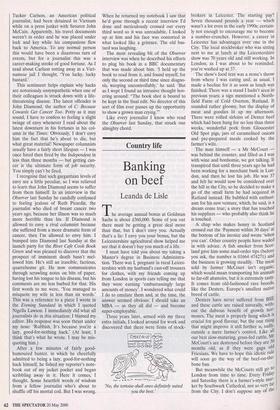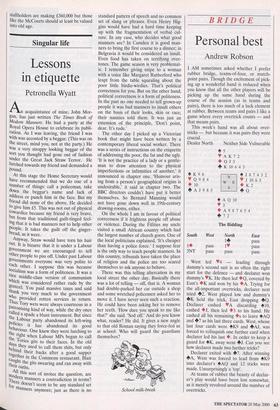Country life
Banking on beef
Leanda de Lisle
The average annual bonus at Goldman Sachs is about £360,000. Some of you out there must be getting a great deal more than that, but I don't envy you. Actually that's a lie: I envy you your bonus, but the Leicestershire agricultural show helped me see that it doesn't buy you much of a life.
I must have told you about my taking a Master's degree in Business Administra- tion. There was I, pregnant in rural Leices- tershire with my husband's cast-off trousers for clothes, with my friends coming up from London in sports cars telling me that they were earning 'embarrassingly large amounts of money'. I wondered what could I do to emulate them and, at the time, the answer seemed obvious: I should take an MBA — as they all did — and become super-employable.
Three years later, armed with my three extra initials, I looked around for work and discovered that there were firms of stock- `No, the tortoise-shell ones definitely suited you the best.' brokers in Leicester. The starting pay? Seven thousand pounds a year — which wasn't a lot even in the early 1990s; certain- ly not enough to encourage me to become a number-cruncher. However, a career in Leicester has advantages over one in the City. The local stockbroker who was sitting next to me at lunch at the Leicestershire show was 70 years old and still working. In London, as I was about to be reminded, you're washed up at 37.
The show's food tent was a stone's throw from where I was eating and, as usual, I made a beeline for it as soon as lunch was finished. There was a stand I hadn't seen in previous years; a sign mentioned a North- field Farm of Cold Overton, Rutland. It sounded rather gloomy, but the display of meat and goodies lit up my afternoon. There were rolled sirloins of Dexter beef which had been hung for no less than three weeks, wonderful pork from Gloucester Old Spot pigs, jars of caramelised onions and pre-prepared meals cooked by the farmer's wife.
The man himself — a Mr McCourt --- was behind the counter, and filled as I was with wine and bonhomie, we got talking. It transpired that until three years ago he had been working for a merchant bank in Lon- don, and then he lost his job. He was 37 and felt he would now be considered over the hill in the City, so he decided to make a go of the small farm he had acquired in Rutland instead. He bubbled with enthusi- asm for his new venture, which, he said, is a dream come true; a story that has touched his suppliers — who probably also think he is touched.
A chap who makes honey in Scotland crossed out the 'Payment within 30 days' at the bottom of his invoice and wrote 'when you can'. Other country people have waded in with advice. A fish smoker from Scot- land gave him some mail-order tips (before you ask, the number is 01664 474271) and the business is growing steadily. The meat sold by farmer McCourt isn't organic, which would mean transporting his animals to far-off abattoirs, but it is extremely tasty. It comes from old-fashioned rare breeds, like the Dexters, Europe's smallest native breed of cattle.
Dexters have never suffered from BSF and these cattle are raised naturally, with- out the dubious benefit of growth hor- mones. The meat is properly hung which is crucial for good flavour, but the one thing that might improve it still further is, sadly, outside a mere farmer's control. Like all our best slow-maturing, grass-fed cattle, Mr McCourt's are destroyed before they are 30 months old, as if they were gaga old Friesians. We have to hope this idiotic rule will soon go the way of the beef-on-the- bone ban.
But meanwhile the McCourts still go r° London from time to time. Every Friday and Saturday there is a farmer's-style mar' ket by Southwark Cathedral, not so very far from the City. I don't suppose any of the stallholders are making £360,000 but those like the McCourts should at least be valued into old age.










































































 Previous page
Previous page